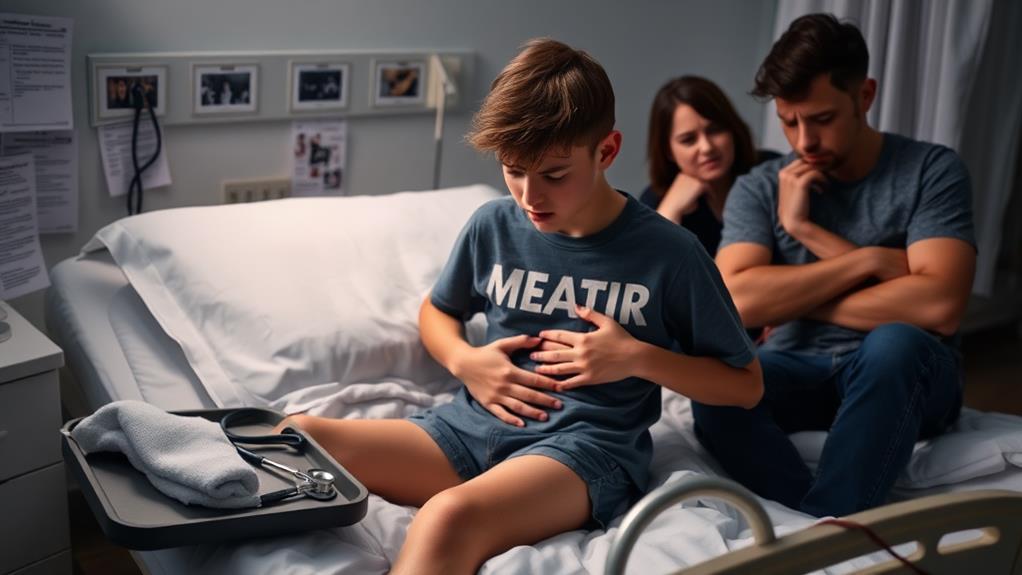When you think about teen abdominal pain, it's easy to overlook the variety of potential causes behind it. From digestive disorders like gastroenteritis and irritable bowel syndrome to acute conditions such as appendicitis, the list is extensive and often surprising. You might not realize that even psychological factors, like stress, can manifest physically. Understanding these possibilities is crucial for recognizing when to seek help or simply manage discomfort. So, what are the other causes that could be influencing those aches and pains?
Gastroenteritis
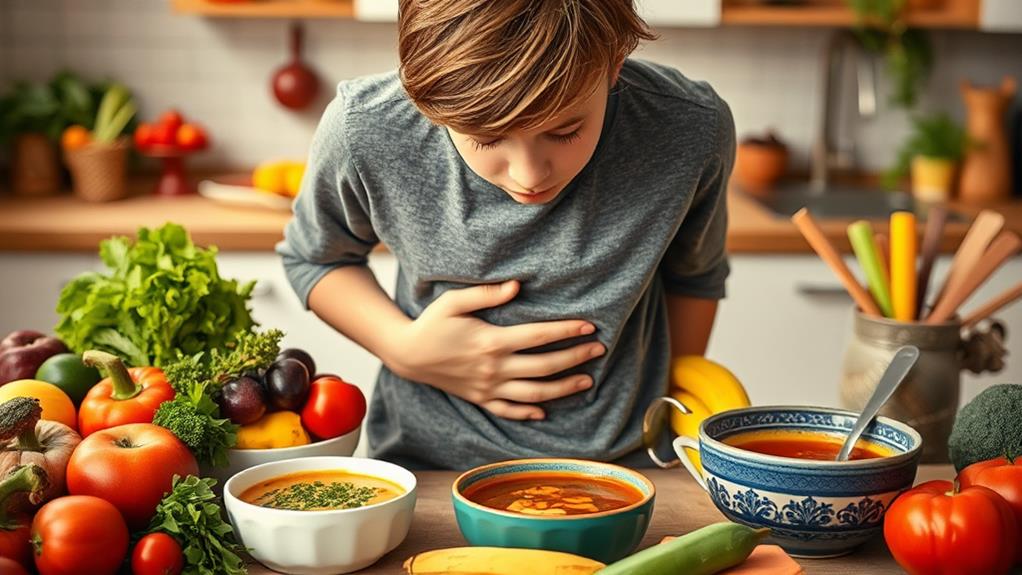
Gastroenteritis, commonly known as stomach flu, affects millions of teens each year. It's an inflammation of your stomach and intestines, often caused by viral infections, though bacteria and parasites can also be culprits. You might experience symptoms like nausea, vomiting, diarrhea, and stomach cramps. These can make you feel pretty miserable, and it's easy to mistake it for other stomach issues.
You can catch gastroenteritis through contaminated food or water, or even from close contact with someone who's sick. If you've shared snacks with friends or attended a gathering where food wasn't handled properly, you might be at risk.
To help yourself feel better, drink plenty of fluids to stay hydrated. Even though you mightn't feel like eating, try bland foods like crackers or toast once your stomach settles. Rest is crucial, too, as your body needs time to recover.
If your symptoms persist for more than a couple of days, or if you notice blood in your stool, it's important to see a doctor. They can help rule out other issues and ensure you're on the path to feeling well again.
Appendicitis
If you've been experiencing intense abdominal pain, it's worth considering appendicitis, especially if the discomfort is localized in the lower right side of your abdomen.
Appendicitis occurs when your appendix, a small pouch attached to your large intestine, becomes inflamed. This can happen for various reasons, such as blockage or infection.
You might notice other symptoms alongside the pain, like nausea, vomiting, or a loss of appetite. Sometimes, fever and chills can also accompany the discomfort.
Knowing these signs is crucial, as appendicitis can escalate quickly and may require surgery to prevent complications.
If you suspect appendicitis, it's important to seek medical attention right away. Doctors may perform a physical exam and use imaging tests like an ultrasound or CT scan to confirm the diagnosis.
Don't ignore this pain; it's better to be safe than sorry.
Treatment usually involves an appendectomy, which is the removal of the appendix. Recovery typically goes smoothly, and most teens bounce back quickly.
Irritable Bowel Syndrome
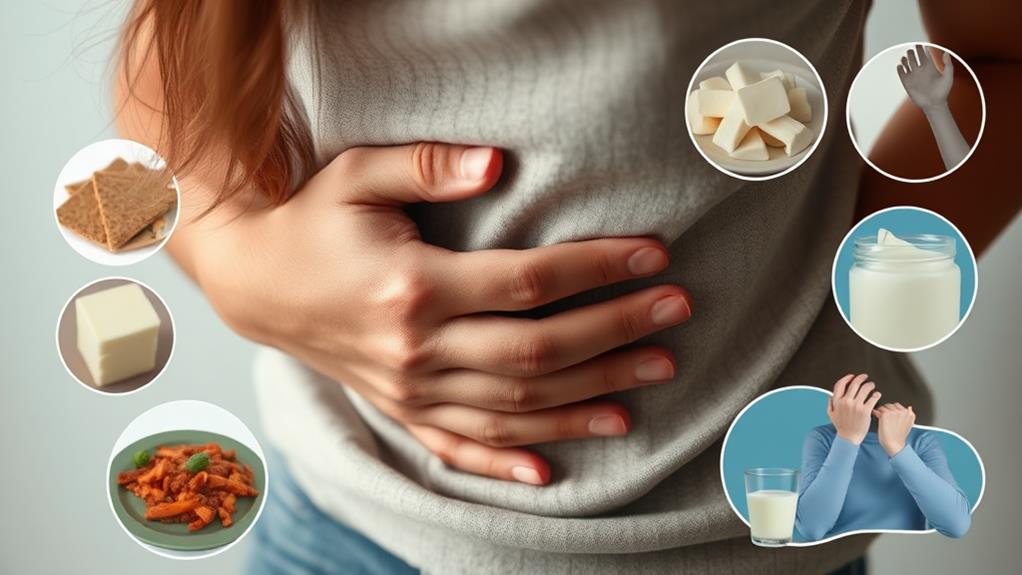
Irritable Bowel Syndrome (IBS) is a common digestive disorder that can cause significant abdominal pain and discomfort. If you're experiencing IBS, you might notice your belly feels crampy, bloated, or gassy, especially after meals. This condition affects how your intestines function, leading to irregular bowel habits. You may alternate between diarrhea and constipation, which can be quite frustrating.
The exact cause of IBS isn't fully understood, but it often relates to stress, diet, and gut bacteria. Certain foods, like spicy dishes or dairy, can trigger symptoms, so it's helpful to keep a food diary. You can identify what makes your symptoms worse.
Managing stress through activities like exercise or mindfulness can also make a big difference.
Talking to a healthcare provider is a good idea if you suspect you have IBS. They can guide you on treatment options, which may include dietary changes, medications, or therapy.
Constipation
Constipation is a common issue among teens that can lead to uncomfortable abdominal pain and a feeling of fullness. You might notice that it's harder to have a bowel movement, or you may feel bloated and sluggish. This can happen for several reasons, including not drinking enough water, not eating enough fiber, or simply not having regular bathroom habits.
When you're busy with school, sports, and social activities, it's easy to overlook your body's needs. If you're skipping meals or relying on fast food, you mightn't be getting the nutrients your body requires to keep things moving smoothly.
To help relieve constipation, try drinking more water and adding fruits, vegetables, and whole grains to your diet. These foods are high in fiber, which can make a big difference in your digestive health.
Also, set aside time each day to relax and let your body do its thing.
If your constipation continues or becomes severe, it's important to talk to a healthcare professional. They can help you figure out the best plan to get you feeling better so you can enjoy your daily activities without discomfort.
Food Intolerances
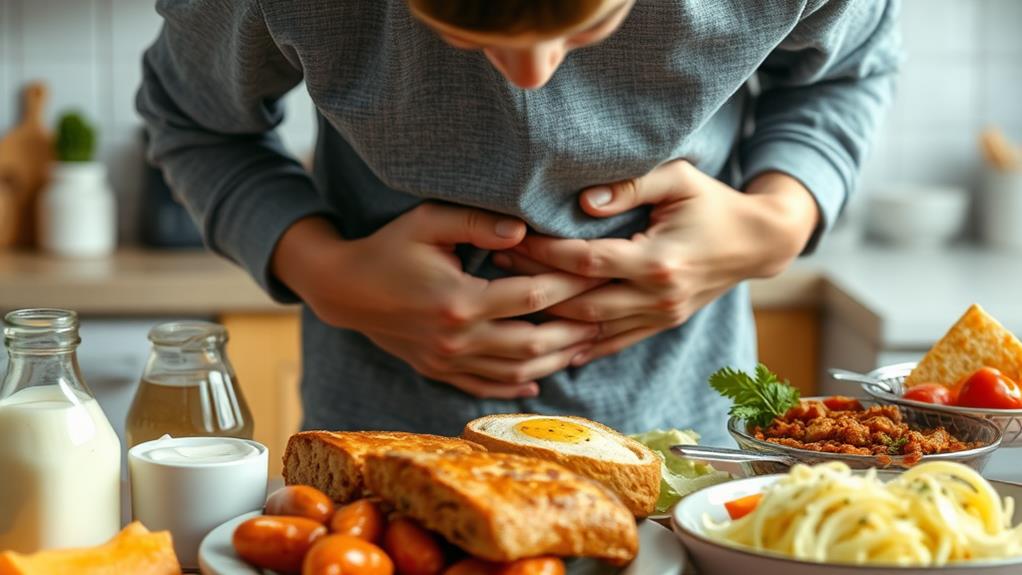
Food intolerances can be a surprising source of abdominal pain for many teens. You mightn't even realize that the foods you're eating could be causing your discomfort.
Unlike food allergies, which can trigger severe reactions, food intolerances often lead to symptoms like bloating, gas, or cramps after eating certain foods. Common culprits include dairy, gluten, and certain fruits and vegetables.
When your body struggles to digest these foods, it can result in painful symptoms. For instance, lactose intolerance means your body doesn't produce enough of the enzyme lactase to properly break down lactose, the sugar found in milk. If you enjoy dairy products but feel sick after, it might be worth considering this intolerance.
Keeping a food diary can help you identify patterns. By tracking what you eat and how you feel afterward, you can pinpoint which foods trigger your symptoms.
If you suspect you have a food intolerance, don't hesitate to talk to a healthcare professional. They can guide you through testing and suggest dietary changes, helping you to feel better and enjoy your meals again!
Understanding your body's reactions is key to managing your health.
Menstrual Cramps
Experiencing menstrual cramps is a common issue for many teens, often causing significant discomfort during their period. These cramps, also known as dysmenorrhea, usually occur when your uterus contracts to help shed its lining. As a result, you might feel sharp pains or dull aches in your lower abdomen, which can sometimes radiate to your back or thighs.
The intensity of menstrual cramps can vary from person to person. Some may only feel mild discomfort, while others might experience severe pain that interferes with daily activities. It's important to understand that this is a normal part of the menstrual cycle, but it doesn't mean you have to suffer through it.
There are several ways to manage these cramps. Over-the-counter pain relievers, like ibuprofen, can help reduce inflammation and ease your pain. Applying heat to your abdomen, such as with a heating pad or hot water bottle, can also provide relief.
Additionally, gentle exercise, like walking or yoga, may help alleviate some of the discomfort. Remember, if your cramps are particularly severe or unusual, it's a good idea to talk to a healthcare professional for further advice.
Stress and Anxiety
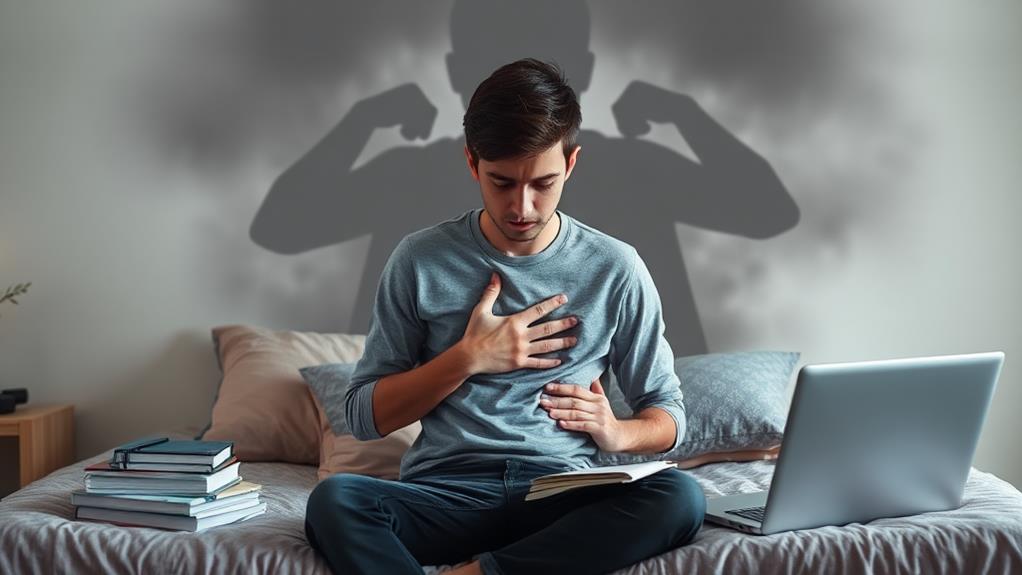
While menstrual cramps can be a significant source of discomfort, stress and anxiety can also contribute to abdominal pain in teens. When you're feeling overwhelmed by school, friendships, or family issues, your body might react in unexpected ways.
Stress triggers your body's fight-or-flight response, which can lead to muscle tension, including in your abdomen. This tension might cause that gnawing pain or discomfort you feel.
Anxiety can also play a role. When you're worried or anxious, your body can produce extra stomach acid, leading to feelings of nausea or discomfort. You might notice that your stomach feels upset before a big test or presentation. It's your body's way of reacting to stress.
It's important to recognize these feelings and find healthy ways to cope. Deep breathing, exercise, or talking to someone you trust can help alleviate both stress and abdominal pain.
Remember, you're not alone, and it's okay to ask for support. Understanding the connection between your emotions and your body can empower you to take control of your well-being.
Prioritizing self-care can make a big difference in how you feel both physically and emotionally.
Inflammatory Bowel Disease
Inflammatory Bowel Disease (IBD) can significantly impact a teen's quality of life. If you're experiencing symptoms like stomach pain, diarrhea, or fatigue, it's important to consider IBD as a possibility. IBD mainly includes two conditions: Crohn's disease and ulcerative colitis, both of which cause inflammation in the digestive tract.
You might find that these conditions can lead to unpredictable flare-ups, making it hard to focus on school or enjoy time with friends. It's not just about physical symptoms; the emotional toll can be heavy, too. You may feel anxious or frustrated, especially when managing dietary restrictions or dealing with frequent bathroom visits.
Diagnosis usually involves a visit to a doctor, who might suggest tests like blood work or imaging studies to confirm the condition. Treatment often includes medication to reduce inflammation and manage symptoms. Sometimes, dietary changes can help you feel better, too.
If you suspect you have IBD, don't hesitate to talk to a healthcare provider. Early diagnosis and treatment can make a big difference in how you feel and help you get back to living your life fully.
Urinary Tract Infection
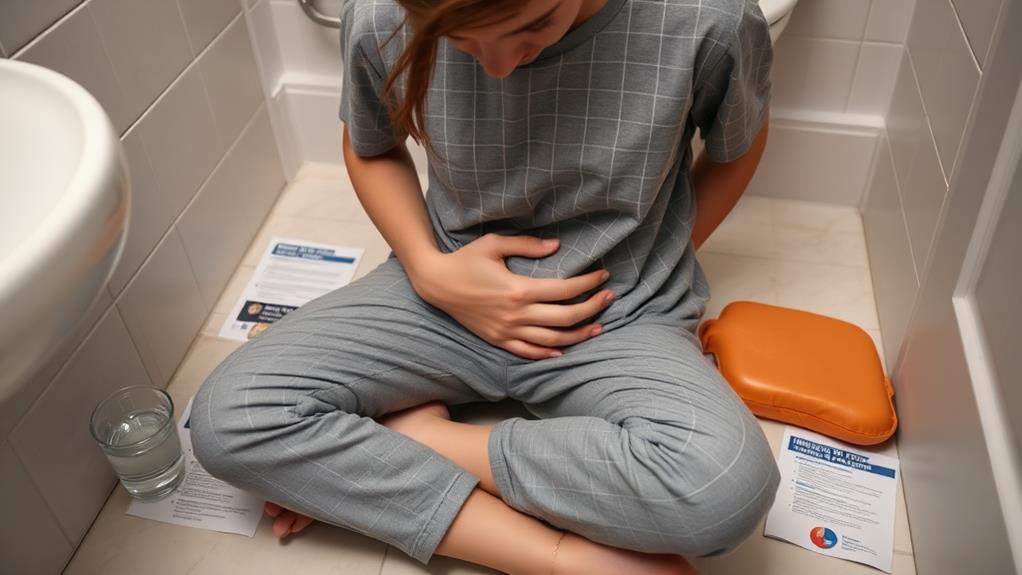
A urinary tract infection (UTI) can cause sharp discomfort and a strong urge to urinate frequently. If you're experiencing this, you might also notice a burning sensation during urination, cloudy urine, or even lower abdominal pain.
UTIs happen when bacteria enter the urinary system, often affecting the bladder and sometimes the kidneys.
Teenagers, especially girls, are more susceptible due to anatomical factors. If you've been active or not drinking enough water, you could increase your risk. It's important to pay attention to these symptoms, as untreated UTIs can lead to more serious complications.
To help prevent a UTI, drink plenty of water, and try to urinate before and after sexual activity. Also, wiping from front to back after using the bathroom can help keep bacteria at bay.
If you suspect you have a UTI, it's crucial to see a healthcare provider. They'll likely recommend a urine test to confirm the infection and prescribe antibiotics to treat it.
Hernia
If you're experiencing abdominal pain and have ruled out a urinary tract infection, a hernia could be the culprit. A hernia occurs when an organ or tissue pushes through a weak spot in the surrounding muscle or connective tissue. This can happen in various areas of your abdomen, often leading to noticeable discomfort.
You might feel a lump or bulge, especially when you're bending over, lifting something heavy, or coughing.
There are different types of hernias, such as inguinal, umbilical, and hiatal. An inguinal hernia happens in the groin area and is common among teens, while an umbilical hernia occurs around the belly button. If you notice any swelling or pain in these areas, it's essential to talk to a healthcare professional.
While some hernias can be managed with lifestyle changes or observation, others may require surgery to fix the issue. Don't ignore the pain, as it can lead to complications if left untreated.
Pancreatitis
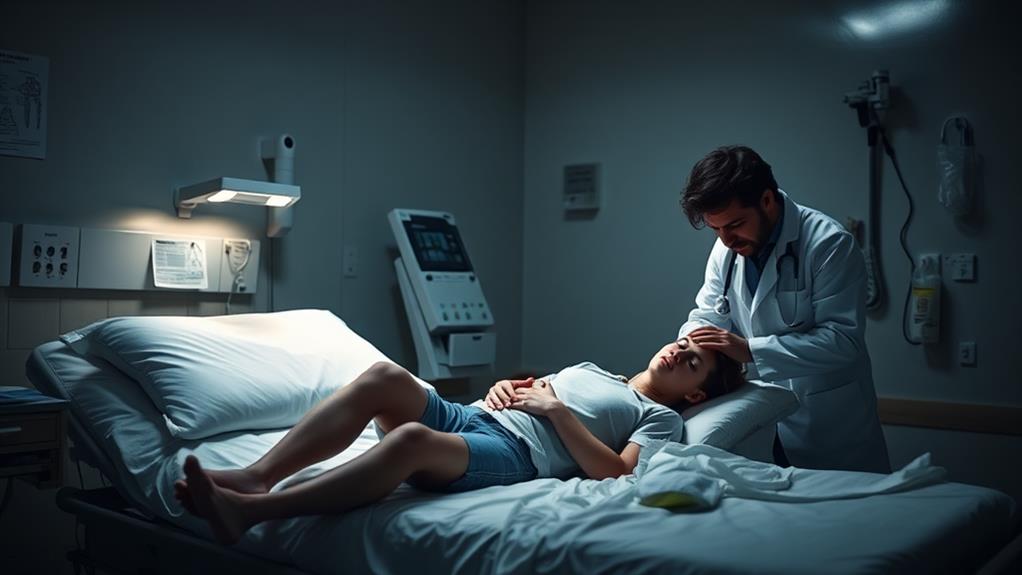
Pancreatitis can cause severe abdominal pain that often radiates to your back, making it hard to ignore. This condition happens when the pancreas, an important organ that helps with digestion, becomes inflamed. You might experience sharp, stabbing pain in the upper abdomen, sometimes accompanied by nausea or vomiting.
It's crucial to pay attention to these symptoms, as they can indicate a serious issue.
Teenagers can develop pancreatitis for various reasons, including alcohol use, certain medications, or even genetic factors. If you've had a gallbladder issue or high triglyceride levels in your blood, these can also increase your risk.
Diagnosing pancreatitis typically involves a physical exam and tests like blood work or imaging studies to see how your pancreas is functioning.
Treatment usually focuses on relieving pain and addressing the underlying cause. This might mean changes in diet, medications, or even hospitalization in severe cases.
If you suspect you have pancreatitis, it's important to talk to a doctor. Early intervention can make a significant difference in your recovery.
Gallbladder Issues
Numerous teens experience gallbladder issues, which can lead to significant abdominal pain. The gallbladder is a small organ that stores bile, a substance your body uses to digest fats. When gallstones form, they can block the flow of bile, causing pain in the upper right abdomen. You might feel this pain after eating a fatty meal, and it can last from a few minutes to several hours.
Another issue is cholecystitis, which is inflammation of the gallbladder. This condition can cause severe pain, especially if you're experiencing nausea or vomiting. If you notice persistent or intense abdominal pain along with these symptoms, it's crucial to talk to a doctor. They can perform tests, like an ultrasound, to determine what's happening.
While gallbladder issues are more common in adults, they can happen to teens too. Maintaining a balanced diet and staying active can help lower your risk.
If you ever feel unsure about abdominal pain, don't hesitate to seek medical advice. It's always better to be safe and get the help you need. Remember, your health is important!
Muscle Strain
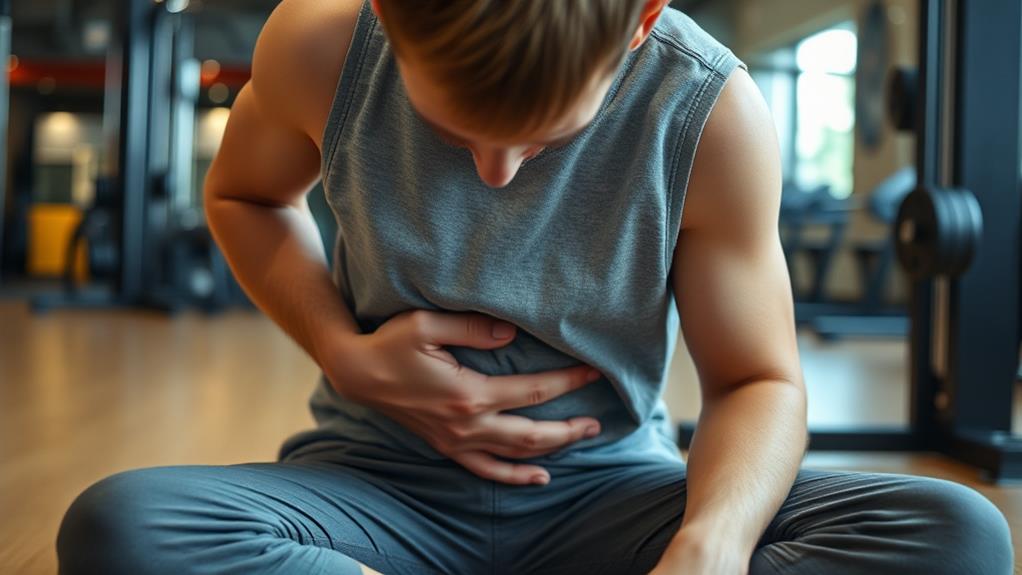
Muscle strain can be a common culprit behind teen abdominal pain, especially if you've recently engaged in sports or heavy lifting. When you overexert your muscles, they can become tight, sore, or even pull, leading to discomfort in your abdomen. This pain might feel sharp, dull, or even cramp-like, depending on the severity of the strain.
If you've been running, jumping, or lifting weights, you might notice this pain shortly after your activity. It's your body's way of telling you that it needs a little rest.
Don't worry; most muscle strains are manageable with some simple care. You can try resting the affected area, applying ice to reduce swelling, and taking over-the-counter pain relievers if needed.
It's essential to listen to your body. If you push through the pain, you might make the strain worse, leading to longer recovery times.
Remember, maintaining proper form during physical activities can help prevent these strains in the future. If the pain persists or worsens, don't hesitate to consult a healthcare professional to rule out any other issues.
Taking care of your muscles today can keep you active and pain-free tomorrow!

